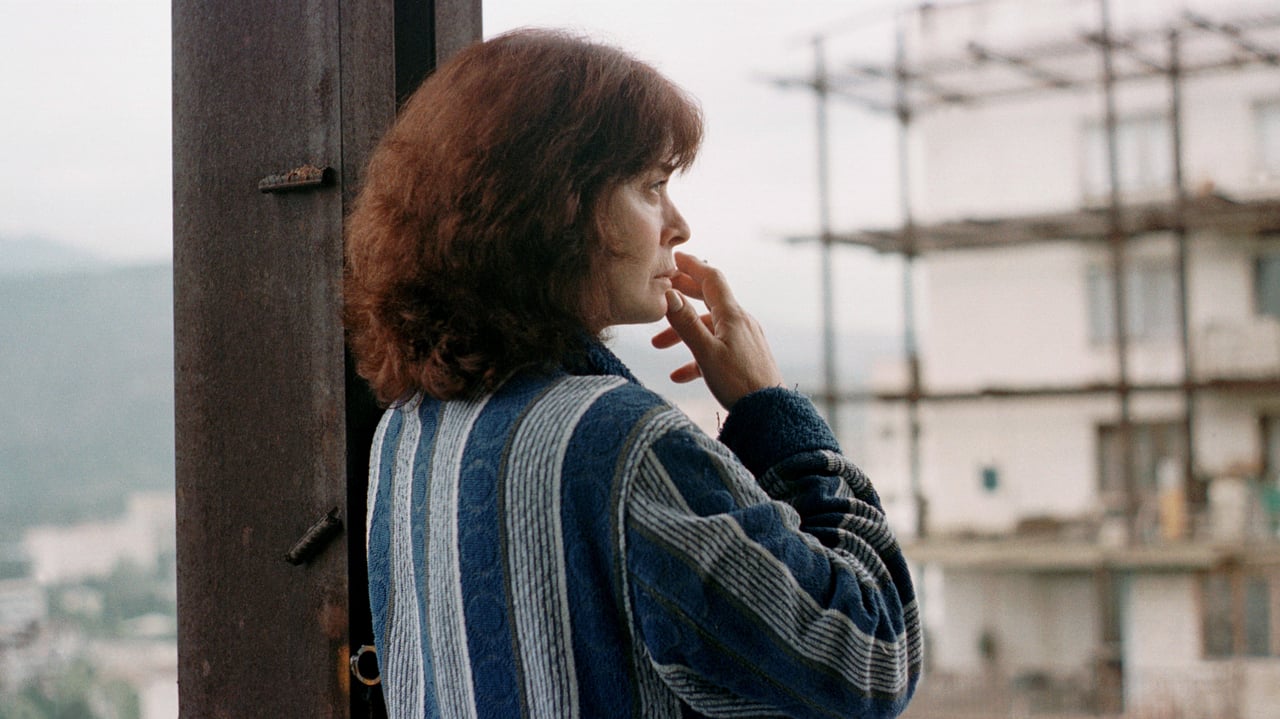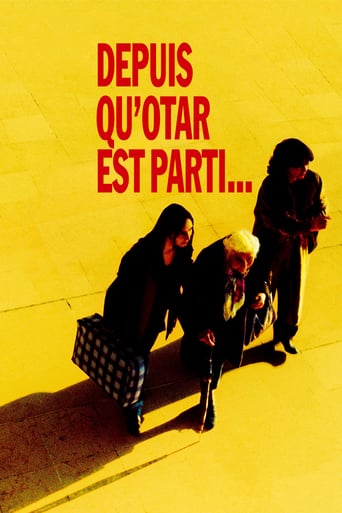



This is a tender, generous movie that likes its characters and presents them as real people, full of flaws and strengths.
View MoreThis movie was so-so. It had it's moments, but wasn't the greatest.
View MoreThe film's masterful storytelling did its job. The message was clear. No need to overdo.
View MoreUnshakable, witty and deeply felt, the film will be paying emotional dividends for a long, long time.
View MoreThe DVD was just sitting there on the shelf at the library, so I had to see it.It is in French and Russian with English subtitles. However it is often hard to tell whether they were in Georgia or France.Otar studied medicine in the East European country of Georgia but went to Paris to make a living. He regularly sent letters back home with some money in them. Sometimes he called. From the smile on her face and the tone in her voice we know his elderly mother missed him, and saved a special place in her heart for him.Otar's mother is Esther Gorintin as Eka. The middle family member was Otar's sister, Nino Khomasuridze as Marina. And the junior member was Dinara Drukarova as Ada (pronounced 'ahh - daa').The film was made in a very natural style, it seemed that we were looking at real people going about their lives. It is a very touching story, but it is told in punishingly slow motion. Even when Eka walks in slow motion. The last half hour is worth the wait, but it seems as if there was a 35 or 40 minute movie here, that was told very slowly to fill 95 minutes.SPOILERS: The family gets word that Otar had a very bad accident, Ada and Nino went to see him but found that he had died from a 5-story fall from a scaffold. They didn't have the heart to tell old Eka, so pretended he was doing fine. Ada even went as far as writing fake letters from Otar. But old Eka had to see her son again before she couldn't, so sold all the valuables in her home to afford airfare. She brought along her daughter and her granddaughter. While the two younger women looked up Otar's grave, Eka went looking for him at the building of his address. She found out the truth, but hid it from Ada and Nino because she didn't want to upset them, instead saying Otar had gone off to America to make his life. As they were all in the airport terminal to go back to Georgia, Ada went to buy magazines, but she didn't return. Instead she told them goodbye through glass walls, she stayed in Paris to make her life.
View MoreIt is very difficult to define this film. In fact, every definition is fake because the essence of words or gestures is ineffable.Otar may be a type of Godot. The incarnated hope, the symbol of filling or image of any victim.The three women- variant of Tchekov's "Three sisters".But the reality is not so easy. In East Europe of Communist era, The Occident was the Heaven in all senses. It was the lost Paradis, the normality, the escape. A part of this wonderful world was shield against the daily nightmare. The fall of Communism was not the solution. Occident is a form of chimera not like education or mentality's result but like the personal treasure.The film is not a moral lesson or image of ex-Sovietic country in transition to European values. It is not an Andre Makine's page. It is only a short life's story and description of a subtle escape. It is slice of dream's rules, descending in past who remains only present and future.Esther Gorintin's acting is magnificent. A powerful character with a victim's mask, a fragile grandmother for who the life is not only fight or fear, past memories or sweet desire but a form of world's contemplation.In fact, Eka is the Ada's image. And Otar's death- solution of interior crisis of every character. The end of life in nostalgic universe.
View MoreI have always professed a weakness for films about fathers and sons, or more broadly, those which can make me weep. Since Otar Left did none of the above. No matter, as the layers of truths revealed in Since Otar Left astounded me. For instance, this film understood middle-aged daughters. To a certain degree, they are jealous of the perceived greater affection their mothers have for sons. (I have seen such mindsets in my relations). This self-doubtful disgruntlement may not degrade their love, but it imprisons them all the same. Sadly, by the time a person (man or woman) reaches middle-age, a dogmatic mind invariably sets in. Reconciliation on above regretful things is hence, no longer an easy thing. Swinging from the pivot of middle age lies two extremes of womanhood, youth and old age. Throughout, the grandmother displayed surprising power and tenacity. Her resolve to find her son and her acceptance of what she found, speaks volume about the steely strengths stored in those whom we'd often think too weak. The young granddaughter is idealistic, quiet but undeniably seething with latent anger. Blessed with uncanny intuition, she sees her spirits slowly sucked dry by the failure of the system and the heavy baggage of her family. Her ambitious decisiveness in breaking free from her chains, is symbolic and uplifting. It helped the film to end on a genuinely hopeful note. On another level, there's a running theme in films I particularly respond to; the telling of "lies". "So what if we know (about the lies told)?" "So what if we don't know?" Goodbye Lenin attempted to essay this morality conundrum with a son hiding from his mother, the fall of a socio-political system. By shading its arguable propaganda with the sensitivity of familial love and stunning piety, that film dispensed a balmy mix of warmth and sincerity. Thus heartening tears were shed by this sentimental sod. That said, it is now my opinion that the "tearless" Since Otar Left embraced so much more of above tricky theme. By film's end, it delivered something which only the greatest films do; invaluable human lessons. We may have been told lies or are guilty of telling them. But if we take the time to unravel the "truths" behind them, the lies may no longer matter. For sometimes, the purity of good intentions may suffice. Hence IMO, to hail Since Otar Left as a life affirming masterpiece is highly justifiable. In a mere 100 odd minutes, it dethreaded the complex tapestry of the human heart and distilled life's essence into basic building blocks like trust, hope, kinship and unconditional love. It exudes goodness of heart and truthfulness of emotions. This effortlessly cathartic film shall receive the Sinnerman's stamp of approval till my saliva-laced ink run dry. In closing, I think films like Since Otar Left cement my faith in a most purposeful of religions; cinema. For bit by bit, they shape my being and nourish my spiritual hunger. All in, they fuel my desire to chase for life's meanings. Hopefully, when this search is over, I will be found.
View MoreThe critics were like "a movie that will break your heart" etc. So a friend of mine and I had great expectations when we decided to watch this movie.I'll make it short and leave it up to others to write about its content. This movie tries to touch you, to reach your heart. But it fails. At least for me. And for my friend, too.Everything that happened happened only on the screen. It was always THERE, not HERE, where I am. I thought most of the time "hmm, something's happening on the screen, but it's only on the screen. It's not real."Movies which succeeded MUCH better in touching me: East of Eden (1955), Terms of Endearment (1983), Jerry Maguire (1996), Babe (1995), Mies vailla menneisyyttä (2002)
View More